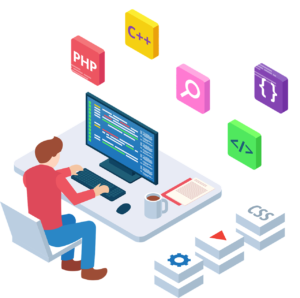
Here are five of the best programming languages for web development, each suited to specific needs and aspects of web applications:
1. JavaScript
- Why It’s Popular: JavaScript is essential for front-end development and often paired with HTML and CSS to create dynamic, interactive user interfaces.
- Applications:
- Front-end frameworks like React, Angular, and Vue.js.
- Back-end development using Node.js.
- Key Features:
- Client-side and server-side scripting.
- Extensive library and framework ecosystem.
- Easy to integrate with other languages.
2. Python
- Why It’s Popular: Known for its simplicity and readability, Python is a versatile choice for back-end web development and scripting.
- Applications:
- Building scalable web applications using frameworks like Django and Flask.
- Handling server-side logic and APIs.
- Key Features:
- Easy learning curve for beginners.
- Robust frameworks for rapid development.
- Support for AI, ML, and data science integrations.
3. PHP
- Why It’s Popular: PHP is widely used for server-side scripting and powers about 75% of websites, including WordPress.
- Applications:
- Content management systems (e.g., WordPress, Joomla, Drupal).
- Dynamic server-side applications.
- Key Features:
- Open-source with extensive community support.
- Seamless integration with databases like MySQL.
- Easy to deploy on most web servers.
4. Ruby
- Why It’s Popular: Ruby, especially with the Ruby on Rails framework, is known for its convention-over-configuration philosophy, making it a great choice for rapid development.
- Applications:
- Startups and MVPs (Minimum Viable Products).
- Web apps like Shopify and GitHub.
- Key Features:
- Developer-friendly syntax.
- High productivity due to pre-built modules and plugins.
- Large supportive community.
5. TypeScript
- Why It’s Popular: A superset of JavaScript, TypeScript offers static typing, which helps catch errors during development.
- Applications:
- Large-scale JavaScript projects.
- Frameworks like Angular are TypeScript-first.
- Key Features:
- Enhances JavaScript with robust tooling and type safety.
- Better maintainability for complex codebases.
- Backward-compatible with JavaScript.
Honorable Mentions
- HTML & CSS: While not programming languages, they are essential for structuring and styling web pages.
- Go (Golang): Gaining popularity for its performance and concurrency in building scalable applications.
- Java: A reliable choice for enterprise-level web applications.
Each language has its strengths, so the best choice depends on the project’s requirements, your expertise, and the ecosystem you want to leverage.

